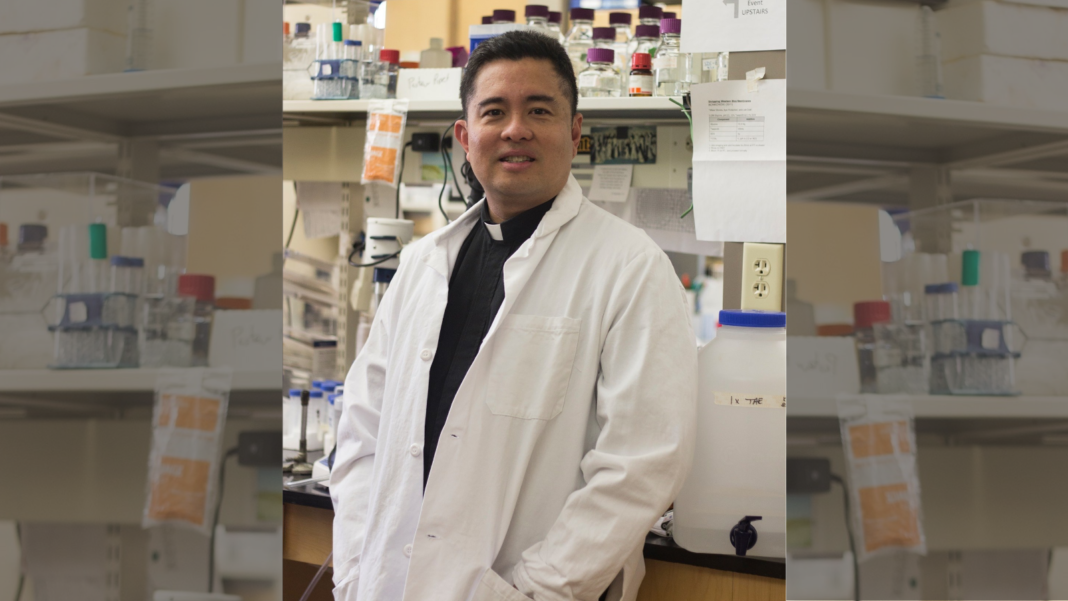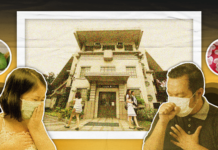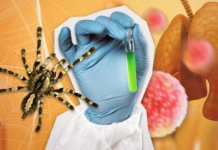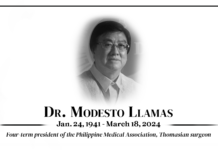A DOMINICAN priest-scientist urged Filipinos to only believe in scientific data as the country deals with low vaccine confidence and politicians promoting an unproven and unregistered antiparasitic drug as Covid-19 treatment and prophylaxis.
Results of a Pulse Asia survey released in March revealed that only 61 percent of Filipinos were willing to get inoculated against Covid-19, while 23 percent are unsure whether to get the vaccine.
But vaccines against Covid-19 help regardless of varying efficacy rates, said Fr. Nicanor Austriaco, O.P., a molecular biologist and visiting professor in the Department of Biological Sciences.
The best vaccine is the “vaccine that is offered to you,” he said during Inkblots: The Webinar, the first online edition of the journalism conference organized by the Varsitarian.
“You should not worry about the efficacy because all three of these vaccines have been shown to be protective against severe disease and hospitalizations,” said Austriaco, who is also a member of the OCTA research group.
The three vaccines Austriaco referred to were China’s CoronaVac, UK’s AstraZeneca and Russia’s Sputnik V—some of the vaccines that will be used in the Philippines’ inoculation drive.
Austriaco said that the most important effect of the vaccines is preventing an individual from contracting severe Covid-19.
“[A]ll three of these vaccines have been shown to be 100-percent protective against severe disease and hospitalizations. What does this mean? It means that if you are vaccinated with any of these vaccines, you may get Covid-19, but that disease will be mild and you will need not to go to the hospital—and that’s what really is important,” he said.
A separate survey conducted by Austriaco’s team, the UST Covid-19 Vaccine (UST-Covax) Awareness Team, recently found that only 55.9 percent of Filipinos were willing to get vaccinated.
The survey asked respondents to rate their confidence and preference in Covid-19 vaccines manufactured in three regions namely China, Russia and the West.
Among the three choices, vaccines made by European or American developers garnered the highest confidence rate at 75.3 percent; 38.6 percent were most confident in Russian vaccines; and 17.7 were in most confident of those made in China.
READ: UST survey finds 56% of Filipinos willing to receive Covid-19 vaccines
Recently, some lawmakers have started campaigning for the use of ivermectin, an anti-parasite drug, for Covid-19 treatment.
Currently, the registered Ivermectin products in the country for human use are in topical formulations under prescription use only, according to the Food and Drug Administration (FDA). This is used for the treatment of external parasites such as head lice and skin conditions such as rosacea.
The FDA has warned against taking animal drugs, as they have only been evaluated for their safety and efficacy in the particular species for which they are labeled.
“Using these products in humans can cause serious harm. Animal drugs are often highly concentrated and can be highly toxic to humans,” the FDA said.
Austriaco said the FDA-approved Covid-19 vaccines would help solve the country’s Covid-19 woes, but asserted that they will only work if the public trusts them and lets them into their bodies.
Austriaco also appealed to already-vaccinated Filipinos to share their personal vaccination testimonies to inspire others to get vaccinated.
“[W]e do this to appeal to the brain of the Filipino. The Filiipino is not just a person who thinks: He’s also a person who loves, which is why in order to speak the truth, we have to speak truth using personal testimonies that appeal to the Filipino heart,” he said.
‘Project Pag-asa’
While drug firms worldwide are racing to put out their own Covid-19 vaccines, Austriaco is also cooped up in his laboratory in the US experimenting on the prospect of yeast as a cheaper, more efficient vaccine delivery system.
In an interview with the Varsitarian, Austriaco said that several pharmaceutical companies in the country have already reached out for collaboration, but he said that they will “just do the science” and hope that the vaccine will be available in drugstores with a prescription.
People should, however, still get vaccinated with the available Covid-19 vaccines, as the yeast oral vaccine will not be commercially available until a year from now, he said.
“[M]y hope is that this oral vaccine will actually be able to help Filipinos who have received the first vaccine as a booster shot for the years to come,” he added.
Austriaco was supposed to return to the Philippines to set up the animal-based testing laboratory at UST, but his trip was halted as the government reverted Metro Manila to enhanced community quarantine, the most stringent lockdown classification, to contain the spike in Covid-19 infections.
READ: Dominican scientist eyes UST for first Filipino-made Covid-19 vaccine test
While his yeast-based vaccine has yet to be named, Austriaco calls his experiment “Project Pag-asa,” named after his intention of bringing hope to the Covid-19-darkened world.














